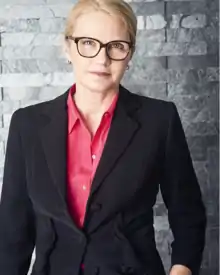Helen Winkelmann
Dame Helen Diana Winkelmann GNZM (born 1962) is the 13th and current Chief Justice of New Zealand, having been sworn in on 14 March 2019. She is the second woman to hold the position, following her immediate predecessor, Sian Elias.

Helen Winkelmann | |
|---|---|
| 13th Chief Justice of New Zealand | |
| Assumed office 14 March 2019 | |
| Nominated by | Jacinda Ardern |
| Appointed by | Patsy Reddy |
| Preceded by | Sian Elias |
| Personal details | |
| Born | 1962 (age 58–59) |
| Alma mater | University of Auckland |
| Profession | Barrister |
Early life and family
Winkelmann was born in 1962 to Kathleen Winkelmann (née Papich), of Croatian descent, and her husband Douglas Winkelmann.[1] She was raised in the Auckland suburb of Blockhouse Bay, and educated at Lynfield College.[1] She went on to study history and law at the University of Auckland, with a focus on commercial law, and graduated with a Bachelor of Laws and Bachelor of Arts in history.[1] She was awarded the Auckland District Law Society Centenary Prize for best undergraduate degree, and was admitted to the bar in 1985.[1]
Winkelmann's sister is the New Zealand fashion designer Adrienne Winkelmann.[2]
Early judicial career
Winkelmann began work as a law clerk with Auckland firm Nicholson Gribbin (later Phillips Fox, now DLA Piper). In 1988, at age 25, Winkelmann became the first female partner and one of the youngest partners ever in the firm's then 117-year history. She remained at that firm until May 2001 when she began practice as a barrister sole specialising in insolvency, commercial litigation and medical disciplinary litigation.
Winkelmann was appointed a High Court Judge in July 2004 by which time the youngest of her four children, twins, were aged five. She was appointed as Chief High Court Judge with effect from 1 February 2010. She remained in that position until her appointment to the Court of Appeal in 2015.
As Chief High Court Judge, Winkelmann introduced reforms aimed at improving accessibility to the High Court's processes in its civil jurisdiction, improving the timeliness with which the Court dealt with both civil and criminal matters, and improving public understanding of the work of the Courts. These initiatives included the reintroduction of the publication of annual reports for the High Court, which included the Court reporting against judgment timeliness standards, and the introduction of the Higher Courts (now Senior Courts) Twitter account to improve communications with the public.
She has spoken regularly on issues concerning the just and efficient operation of the Courts, and access to justice. This was the topic of her 2011 Ethel Benjamin address, ‘Access to justice, who needs lawyers?’ (2014) 13 Otago LR 229.
In 2011, following the devastating Canterbury earthquakes, Winkelmann worked with Justice Miller to set up the Earthquake List in Christchurch. The objective of that List was to enable proceedings flowing out of the Christchurch earthquake to be dealt with promptly and in a time frame that met the needs of the community. (For a discussion of the High Court response to the earthquake see Nina Khouri, “Civil Justice Response to Natural Disaster: New Zealand’s Christchurch High Court Earthquake List”, Civil Justice Quarterly 36(3)).
Winkelmann also worked with other Heads of Bench to establish Court procedures, including opening and closing of the Court day, so that the Court's processes better reflect the two founding cultures of New Zealand, Māori and Pakeha.
Winkelmann was jointly awarded the Australasian Institute of Judicial Administration Award for Excellence in 2013, for her work in judicial administration flowing out of the Christchurch earthquake.
Winkelmann joined the Court of Appeal Bench with effect from 1 June 2015. She is the Chief Justice's representative on the Council of Law Reporting. She is also the Chair of the Institute of Judicial Studies, the body responsible for providing continued education to judges. As Chair of the institute, she oversees a curriculum which supports judges in developing core judicial skills and which also incorporates courses providing judges with the context necessary to enable them to judge in a diverse society.
Rulings
In the high-profile case where US authorities were seeking to have Kim Dotcom arrested and extradited, Winkelmann ruled on 28 June 2012 that the warrants used to seize Dotcom's property were illegal because they were too broad. "These categories of items were defined in such a way that they would inevitably capture within them both relevant and irrelevant material. The police acted on this authorization. The warrants could not authorize seizure of irrelevant material, and are therefore invalid."[3] Winkelmann also ruled that the handing of hard drives seized by New Zealand police in the raid to the FBI was in breach of extradition legislation, and the FBI's removal from New Zealand of cloned data from them was unlawful.[3]
Chief Justice
On 17 December 2018, it was announced that Winkelmann would succeed Dame Sian Elias as Chief Justice,[1] and she was sworn in on 14 March 2019,[4] becoming the second woman to hold the office.
In the 2019 Special Honours, in preparation for her taking up the role of Chief Justice, Winkelmann was appointed a Dame Grand Companion of the New Zealand Order of Merit.[5]
References
- "Appointment new Chief Justice". Courts of New Zealand. 17 December 2018. Retrieved 17 January 2018.
- "National portrait: Helen Winkelmann Chief Justice". Stuff.co.nz. 16 March 2019. Retrieved 28 June 2020.
- "Dotcom searches illegal: Judge". The New Zealand Herald. 28 June 2012. Retrieved 31 December 2018.
- "Chief Justice Helen Winkelmann sworn in". Auckland District Law Society. 15 March 2019. Retrieved 16 March 2019.
- "Special Honours List 4 March 2019". Department of the Prime Minister and Cabinet. Retrieved 4 March 2019.
External links
- Courts of New Zealand – The Current Chief Justice
| Legal offices | ||
|---|---|---|
| Preceded by Sian Elias |
Chief Justice of New Zealand 2019–present |
Incumbent |